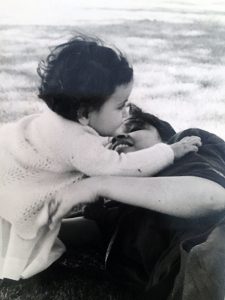
I edited a story this week about a woman who found rebirth through a pregnancy during the pandemic. I tried hard to understand how she felt and yet, the concepts of motherhood were so alien to me.
I have never been a mother. I will never be one.
I had a mother once. I will never have one again.
My mother died 20 years ago today, exactly two months after the death of my father. Sometimes, that day, still fresh in my mind, seems distant and long ago. I suppose it depends on how I look at 20 years. It’s almost 35 percent of the time I have been alive. It’s how old I was the day my mother suffered a massive stroke that left her paralyzed on her left side and robbed her of her cognitive abilities.
May 19 was oppressively hot in Kolkata in 2001. The monsoons had not yet arrived and the temperatures had climbed well into the 90s, perhaps more. In the middle of the day, when cars, buses, trucks, tuk-tuks, carts, bicycles jostled for space with one another and with the millions of people on the streets, it seemed hotter. A raging heat that would not subside. In the middle of the day, when we had just finished a simple lunch of rice, lentils and fish, the phone rang. It was an old landline phone; its ring as familiar to me as a friend’s voice.
But it was not a friend who was calling. I knew who it was. My brother, Shantanu, answered. And I knew what he was hearing. But he did not say much. In silence, we abandoned our lunch, put on our shoes and whooshed down a flight of stairs and out the entrance to our building, Balaka. We ran through the old petrol pump where many a time I had waited to fill up the tank to my father’s Fiat that resembled a Soviet Lada. We dodged the maniacal traffic. We held up the palms of our hands to stop cars so that we could cross AJC Bose Road. Otherwise, we might have stood at the intersection of Loudon Street for eternal minutes. We rushed through the gates of Belle Vue Nursing Home and up seven flights of stairs to the intensive care ward. I felt the sweat streaming down my back, my cotton kameez so wet that it looked like I had come through rain. The sweat stung my eyes and I tasted the salt in my mouth. I could hardly see. I could hardly breathe. I saw my mother lying in her bed, her chest heaving up and down and I thought: Thank God. She was still alive. I glanced at the monitor beside her bed. Flatlined. Was she dead? No, no. She was alive. Wasn’t she?
I remember my mind going to blank. And when I could think again, I knew it was the ventilator that was doing all the work. The nurses were not authorized to stop it until the doctor had arrived.

So it was that my mother died. On that oppressively hot May 19 in 2001.
We held a small memorial service for my mother on the last weekend of May. By then, we had emptied out the flat she and my father had shared for so many years, stripped it of any evidence that they had done so. I stared at the outlines of paintings that once graced their home, the paint a lighter shade where the wall had been covered up. The only thing that even hinted at the life my parents had were the few remaining plants on the balcony. My father had once filled it with dahlias, marigolds and hibiscus. But one by one, they wilted after Alzheimer’s pulled him down and rendered him useless.
We threw down sheets and blankets on the empty terrazzo floors for the guests. They sat on them and listened to memories shared by friends and family. We sang the songs of Rabindranath Tagore, my mother’s God. I held my brother’s hand, wanting to never let go.
It was the middle of the day when the ceremony began, when it seemed hotter than it really was. And when it ended, I felt a comforting breeze on my cheeks, as though my mother were kissing them. The clouds hid the sun and I could smell the coming rain in the air. I knew the worst was over. The heat would subside soon as the monsoons drenched the city, cleansing it of its dust and sins. I looked up at the hibiscus swaying in its terracotta pot, the soil cracked like a parched riverbed. The plant had dropped leaves and grown somewhat woody. Clearly, it had been stressed.
But even out of that stress came love. In the middle of the day, when we gathered to remember my mother, that hibiscus plant bore a single bloom bursting in vermillion.

Moni… you paint such a picture. I’m sitting here with my father, watching him go down the path of dementia and remembering my Mother’s different path down Alzheimer’s 10 years earlier. This seems to be the plague of our generation but your memories are so vibrant. I remember often swinging by your house just off FSU campus to pick up Shantanu to go somewhere or other that high school kids go and I never remember talking to either of your parents. Your writings really make me feel that my youth, always in a hurry, really missed out on getting to know some amazing people. I think of you often and am very glad that the internet has allowed me a small peek into your life post CNN. I am so happy glimpsing the impact you are having on the next generation. Do me a favor and ask them to slow down just a little. It might add flavor to their life now while minimizing future regret.
Enjoyed reading this Moni, thanks!
rbh